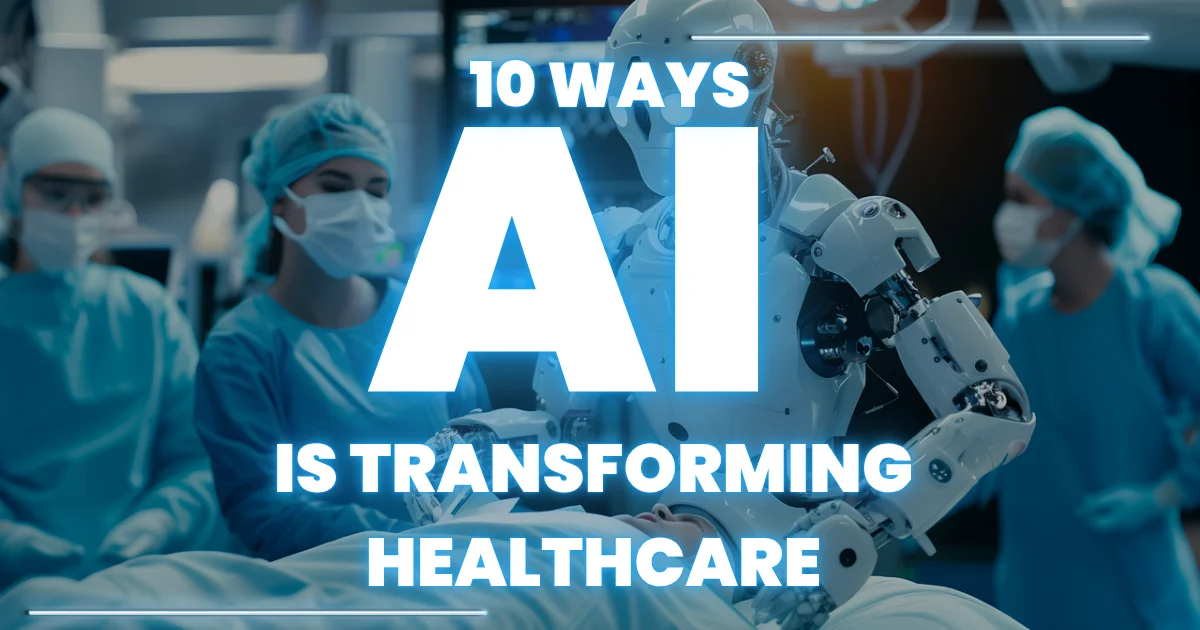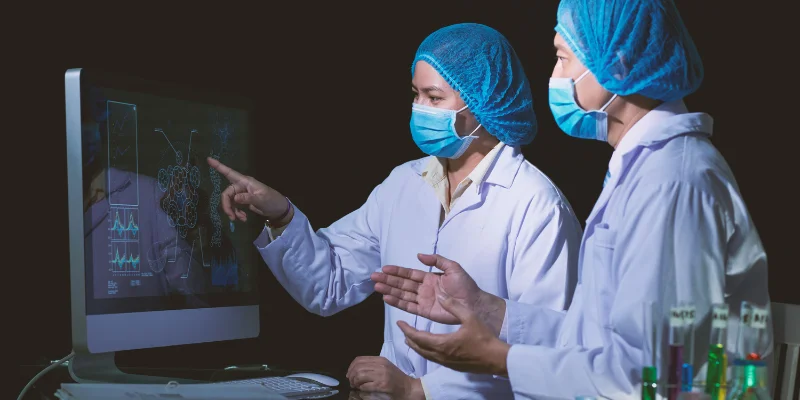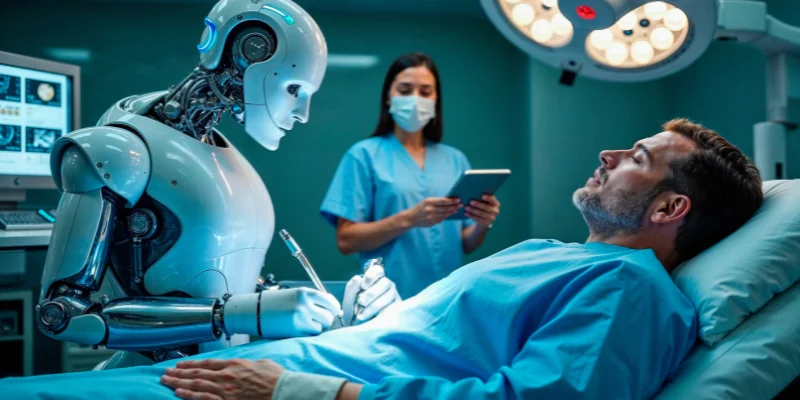Sales Team
Project quotes, partnerships, implementation

Artificial Intelligence (AI) has become one of the most transformative forces of the 21st century, reshaping industries and redefining the way humans interact with technology. Among all sectors, AI in healthcare stands out as one of the most impactful applications of artificial intelligence.
From improving diagnostic accuracy to streamlining hospital operations and empowering personalized medicine, artificial intelligence in healthcare is transforming how patients are diagnosed, treated, and cared for. In 2025, healthcare is smarter, more connected, and more predictive than ever before, thanks to the power of AI.
This detailed blog explores 10 powerful ways AI is transforming healthcare, supported by real-world examples, trends, and insights into the future of medical innovation.
AI’s ability to recognize patterns makes it invaluable in diagnostics. Traditional diagnostic processes can take hours or even days, and human interpretation leaves room for errors. With AI in healthcare, doctors now use intelligent systems to analyze X-rays, CT scans, and MRIs in minutes—sometimes seconds.
Deep learning algorithms are trained on millions of medical images to detect diseases such as pneumonia, tuberculosis, cancers, and fractures with incredible accuracy. For instance, Google Health’s AI model outperformed human radiologists in detecting breast cancer during trials.
AI doesn’t replace doctors—it augments their capabilities. By quickly identifying anomalies and prioritizing critical cases, AI in health care ensures faster diagnoses and timely treatments.
AI is also revolutionizing pathology. Digital pathology slides analyzed by AI can spot cellular abnormalities with microscopic precision, helping pathologists focus on complex cases instead of manual screening.
Every patient is unique. Factors like genetics, environment, and lifestyle influence how a person responds to treatment. Artificial intelligence in healthcare enables the rise of personalized medicine—care tailored specifically to each patient.
AI systems analyze genetic data, lab reports, and clinical histories to predict which drugs and therapies will work best for each individual. This level of customization is especially critical in oncology, where AI helps identify the most effective chemotherapy combinations for cancer patients.
In cardiology, predictive AI models assess a person’s likelihood of heart disease years before symptoms appear. In diabetes management, AI-powered devices continuously monitor glucose levels and offer instant insights.
As the field evolves, healthcare artificial intelligence will continue refining treatment precision—turning reactive medicine into proactive healthcare.
Hospitals are complex ecosystems involving hundreds of professionals, thousands of patients, and countless data points. Inefficiency in even one process can cause cascading delays. That’s where AI in health care is making a huge difference.
AI-powered management systems automate administrative tasks such as patient scheduling, billing, insurance processing, and inventory tracking. Intelligent chatbots handle appointment bookings and respond to patient queries, freeing up time for staff to focus on patient interaction.
Predictive analytics tools use AI to forecast patient inflows, optimize bed allocation, and manage staff rosters. This ensures hospitals remain prepared during emergencies or disease outbreaks.
By automating repetitive tasks, artificial intelligence healthcare reduces human error, saves costs, and ensures smoother hospital operations—all while improving the overall patient experience.

Physicians make hundreds of decisions daily—many under pressure. AI in healthcare enhances clinical decision-making by providing data-driven insights.
AI systems can instantly process data from patient records, lab results, and research studies to suggest the most effective treatment options. For example, in cardiology, AI tools interpret ECGs faster and more accurately than traditional methods. In emergency medicine, AI triage systems assess incoming patients and alert doctors to those requiring urgent care.
AI-based clinical decision support tools don’t replace human judgment but improve it—offering second opinions, cross-checking diagnoses, and reducing the risk of oversight.
This synergy between human expertise and machine intelligence ensures that patients receive safer, faster, and more effective care..
Drug discovery is traditionally slow and costly. Developing a new drug can take over a decade and billions of dollars. But AI for healthcare is changing that timeline dramatically.
Machine learning models analyze chemical structures and predict which compounds are most likely to work against a particular disease. This eliminates years of trial and error. During the COVID-19 pandemic, AI identified potential antiviral compounds within weeks—an unprecedented speed.
In addition, AI enhances clinical trials by identifying the best participants based on genetic and behavioral profiles. It predicts how a patient will react to a drug, improving safety and efficiency.
AI-driven drug development isn’t limited to big pharma. Startups and healthcare app development companies are leveraging AI to innovate new therapies, accelerate research, and reduce costs—bringing life-saving treatments to market faster.
The pandemic accelerated the adoption of telemedicine, and AI and healthcare have since formed a powerful alliance in remote monitoring and digital health.
Wearable devices and sensors collect real-time patient data, which AI algorithms analyze continuously. These systems can detect irregularities—like abnormal heart rhythms or oxygen drops—and alert healthcare providers instantly.
AI-enabled telemedicine platforms use chatbots and virtual assistants to triage patients, interpret test results, and recommend follow-ups. This has been a game-changer for people in rural or underserved regions with limited access to medical facilities.
The integration of artificial intelligence in health care ensures that care extends beyond hospital walls, keeping patients connected and protected wherever they are.
Health artificial intelligence is helping governments, insurers, and health organizations analyze population-wide data to improve outcomes on a global scale. AI systems can identify risk factors for diseases like diabetes, asthma, and hypertension long before symptoms appear.
For example, public health officials use AI to predict flu outbreaks and prepare vaccination campaigns. Predictive analytics also helps identify high-risk communities, allowing early intervention and better resource distribution.
Hospitals use AI in healthcare industry analytics to predict patient readmissions and manage chronic care more effectively. This transition from reactive to preventive care is saving millions of lives globally.
Mental health care has historically been limited by access, affordability, and social stigma. But AI is changing that. AI in healthcare now includes digital mental health platforms that offer virtual therapy sessions, mood tracking, and personalized emotional support.
AI chatbots, powered by natural language processing, provide immediate, empathetic responses for users dealing with anxiety or depression. These tools don’t replace therapists—but they help people manage mental wellness between sessions or in areas where professional help isn’t available.
AI is even used to detect early signs of depression from voice tone, text patterns, and social media activity, enabling timely intervention.
By expanding access and reducing stigma, AI for healthcare is redefining mental health care for the digital age.
Few innovations capture the imagination like AI in healthcare examples involving robotic surgery. Using AI-powered robotic systems, surgeons can perform delicate, minimally invasive procedures with unmatched precision.
These robots analyze real-time data, adapt to movements, and assist surgeons in maintaining control. For example, robotic arms powered by AI can perform cardiac or neurological surgeries where micrometer-level accuracy is vital.
AI also enhances medical devices such as prosthetics, insulin pumps, and implants. These devices learn from patient behavior, self-adjust, and optimize performance for comfort and safety.
By merging robotics, data analytics, and AI, AI in the medical field is paving the way for safer surgeries and faster recoveries.

The digital transformation of healthcare means that millions of patient records are stored electronically. Artificial intelligence in health care plays a crucial role in keeping that data secure and usable.
AI-based cybersecurity tools detect irregular patterns and potential cyber threats before breaches occur. Hospitals use AI-driven systems to monitor networks, encrypt sensitive data, and prevent unauthorized access.
AI also helps improve data interoperability. Different systems—labs, clinics, insurers—can now exchange information securely and efficiently using healthcare artificial intelligence solutions. This not only protects privacy but also enables faster, coordinated patient care.
As healthcare data grows exponentially, AI ensures that it remains safe, accessible, and actionable for the right stakeholders.
The future of AI in healthcare is about collaboration, not competition. Machines and humans will work side by side to deliver smarter, faster, and more compassionate care.
AI’s role will expand from assisting doctors to empowering patients. Wearable AI will help people monitor their health continuously, while predictive analytics will make preventive care more accurate.
In hospitals, expect AI-driven “digital twins”—virtual models of patients that simulate treatment outcomes before doctors proceed. Meanwhile, artificial intelligence trends in healthcare will focus on ethical AI, data transparency, and patient trust.
Even healthcare app development services are integrating AI modules into digital health platforms—combining telemedicine, analytics, and patient management into one seamless ecosystem.
The next generation of AI healthcare innovation promises not just technological advancement, but a reimagined global health system centered on people and precision.
The integration of AI in healthcare is shaping a smarter, safer, and more inclusive future. From diagnostics and drug discovery to mental health and robotics, artificial intelligence healthcare is revolutionizing every facet of modern medicine.
As healthcare continues to embrace digital transformation, the collaboration between human expertise and AI innovation becomes even more vital. With responsible implementation, transparency, and ethics, AI has the potential to solve some of the most persistent healthcare challenges of our time.
At SISGAIN, we are proud to lead this transformation. Our cutting-edge AI solutions for healthcare empower hospitals, clinics, and research institutions to deliver smarter, faster, and more personalized care. From AI-driven telemedicine apps to advanced predictive analytics, SISGAIN is redefining digital health for a better tomorrow.
Together, we’re building a world where technology and compassion coexist—creating a healthier, more connected, and more intelligent future for everyone.
Project quotes, partnerships, implementation
Open roles, referrals, campus hiring